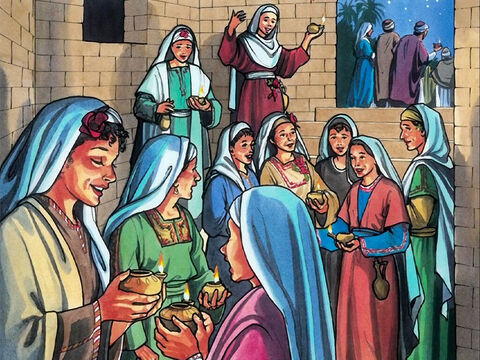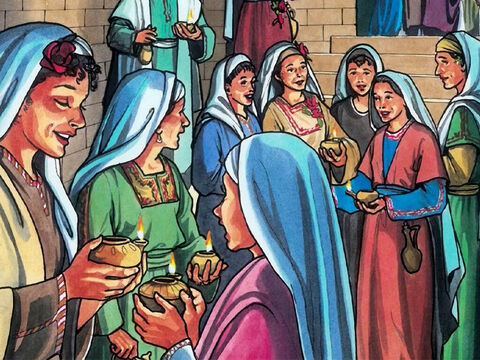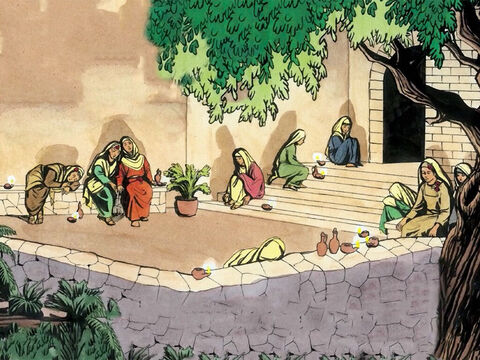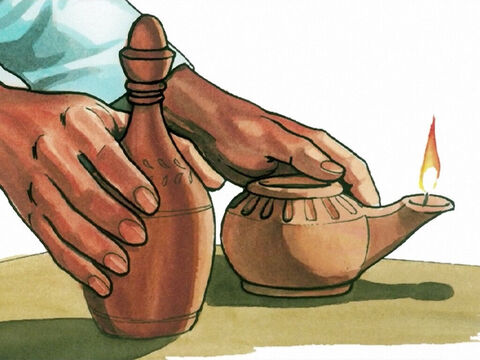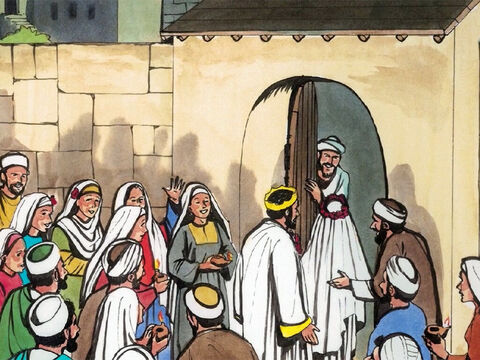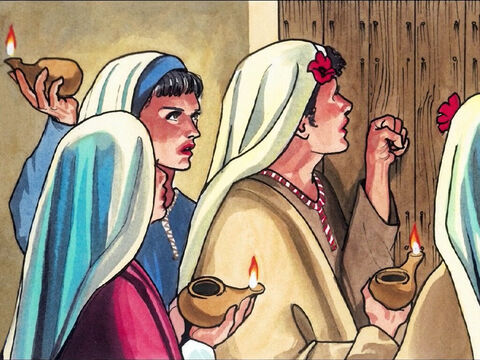Introduction to The Parable Of The Ten Virgins
Meta Description: A timeless parable that Jesus told about the ten virgins for children aged 3+. Discover the joy of a wedding, the importance of being ready for the First Resurrection, and the lessons learned from ten young women and their lamps, filled with light or left in the dark.
Clues to the Parable
- Bridegroom - Jesus.
- Ten Virgins - The members of Jesus' church.
- Marriage - Marriage Supper of the Lamb in Heaven.
- Oil - the fuel that keeps light burning = the Holy Spirit.
- Lamps - the vessel that produces light - life of the members.
- Light in the lamps - righteous living, good deeds, Christian example.
- Foolish virgins - stopped living righteously.
- Wise virgins - continued to let Christ shine His light in them.
The Ten Virgins (Young Women) and Their Lamps
My dear children, gather close, for I have a story for you from our homeland, a story about a wedding. Once there were ten young women, just like big sisters or cousins you might know. They were invited to a very special party – a wedding! The bridegroom was coming to fetch his bride, and her friends were all so excited to greet him with their lamps. Each one held a small clay lamp, ready to light up the path.
But here is something important about lamps: they need oil! Just like you need food to play and run, lamps need oil to glow. Without it, they are just plain clay.
Now, listen carefully, for five of these young women were very, very wise. What did they do? They took their lamps, yes, but they also thought ahead! They knew the bridegroom might be a little late, so they carried extra oil in little jars. "It's good to be prepared!" they might have whispered, smiling. They wanted their lights to shine no matter how long they waited.
But the other five young women, oh dear, they were a little foolish. They took their lamps, but they did not take extra oil. "Oh," they might have thought, "the bridegroom will come soon! We won't need more oil." They just took their lamps, thinking only about the now, not the later.
The Long, Dark Wait
The sun went down, and the evening grew dark and quiet. The young women waited and waited. Sometimes, in our villages, a bridegroom might come in the early evening, but sometimes, he might come very, very late, when everyone was almost asleep. And so it was this night. The hours passed, and the young women grew tired. Their eyelids felt heavy, and one by one, they all lay down and slumbered. They fell fast asleep, every single one of them.
The village was quiet, under the shining stars.
Then, just when the night was darkest, in the middle of the night, a loud shout rang out! "Wake up! Wake up! The bridegroom is here! Go out to meet him!"
Oh, what a surprise! The young women woke up with a jump! They quickly sat up and rubbed their eyes. They looked at their lamps, excited to light them for the procession.
A Cry for Oil and a Closed Door
The five wise young women smiled. They took their little jars of extra oil and poured it into their lamps. Slurp, slurp! The wicks drank the oil, and soon, their lamps blazed brightly! They were ready, their lights glowing, ready to join the happy crowd.
But the five foolish young women looked at their lamps, and their hearts sank. Their lamps were barely flickering, almost out! They had no more oil! "Oh no!" they cried. "Our lamps are going out!"
They turned to their wise friends. "Please! Please give us some of your oil! Our lamps are going out!"
But the wise ones answered, gently but firmly, "We cannot share with you. There will not be enough for all of us if we do! Go quickly to those who sell oil and buy some for yourselves!"
So, in the dark of the night, the five foolish young women hurried away, stumbling, trying to find someone who sold oil. Can you imagine how they felt, rushing through the quiet streets?
While they were gone, rushing to find oil, the bridegroom arrived! The wise young women, their lamps shining brightly, joined the bridegroom and his friends. They walked together, their lights leading the way, and they went right into the wedding hall, where the big party was waiting!
And then, with a soft thud, the doors were shut. Locked.
Later, the five foolish young women came back. They had found oil, and their lamps were finally glowing. But when they reached the wedding hall, the doors were closed. They knocked and knocked! "Lord, Lord," they cried, "open to us!"
But a voice from inside, the bridegroom's voice, answered back, "Truly, I say to you, I do not know you." Their hearts must have been very sad.
Always Be Ready!
My dear children, this story, this parable, has a very important lesson for us, a lesson that the wise people of our land have taught us for generations. It is like what the old prophets said: "Prepare to meet your God!" (Amos 4:12).
You see, the bridegroom in the story is the Lord, who will return one day to catch His saints away to Heaven. This is called the First Resurrection.
The lamps are the waiting believers. The oil is the presence of the Holy Spirit shining the light of Christ through us.
The wise virgins had enough oil, because they kept their lives clean and pure through the work of the Holy Spirit keeping them clean. They kept their hearts full of the fruit of Christ - love, joy, peace, longsuffering, gentleness, goodness, meekness and faith. They did not allow sin to put out the light of God's Spirit in their lives.
On the other hand, the five foolish virgins were carefree. They allowed their spirits to fall asleep and did not allow the Holy Spirit to keep them alive to God. They let the light of God in them go out by failing to pray, failing to read the Word of God, by failing to confess and turn away from sins and by failing to do right.
Jesus the bridegroom is taking His saints to Heaven where there is no sin. We do not know the day or the hour when the Lord will return, just as the young women didn't know when the bridegroom would arrive. So, let us live each day by doing what is right, by helping others, by listening to the truth. Let your inner light shine!
Do you think it's important to be ready? What can we do today to make sure our "lamps" have enough "oil"? Think about it, and let's try to be like the wise young women, always prepared, always shining our lights before other people, so they can see our good works and glorify the Father in Heaven.
The Parable of the Ten Virgins Scriptures Matthew 25: 1-13.
1“Then the kingdom of heaven will be like ten virgins who took their lamps[a] and went to meet the bridegroom.
2 Five of them were foolish, and five were wise. 3 For when the foolish took their lamps, they took no oil with them,
4 but the wise took flasks of oil with their lamps.
5 As the bridegroom was delayed, they all became drowsy and slept.
6 But at midnight there was a cry, ‘Here is the bridegroom! Come out to meet him.’
7 Then all those virgins rose and trimmed their lamps.
8 And the foolish said to the wise, ‘Give us some of your oil, for our lamps are going out.’
9 But the wise answered, saying, ‘Since there will not be enough for us and for you, go rather to the dealers and buy for yourselves.’
10 And while they were going to buy, the bridegroom came, and those who were ready went in with him to the marriage feast, and the door was shut.
11 Afterward the other virgins came also, saying, ‘Lord, lord, open to us.’
12 But he answered, ‘Truly, I say to you, I do not know you.’
13 Watch therefore, for you know neither the day nor the hour.

